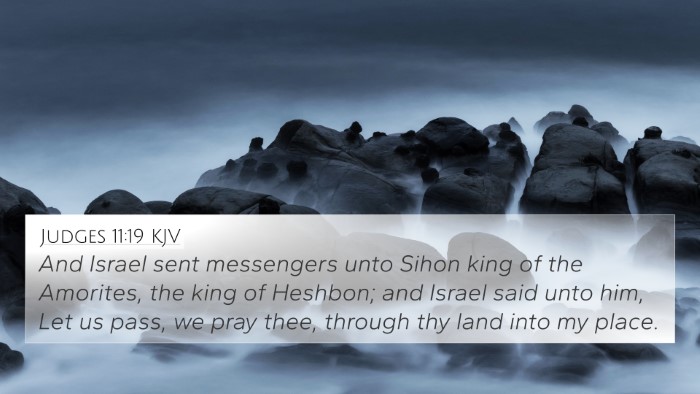Understanding Deuteronomy 2:27
Verse Reference: Deuteronomy 2:27 states: "Let me pass through thy land: I will go along by the highway, I will neither turn unto the right hand nor to the left."
Summary of Insights
The verse captures a moment in the journey of the Israelites as they seek to navigate through the land of Edom. It reflects an appeal for permission and a commitment to respectful coexistence during their passage.
Commentary Insights
- Matthew Henry Commentary: Henry emphasizes the importance of the Israelites' request for passage as an act of respect towards Edom. He highlights the significance of their methodical approach and their commitment to traveling along established roadways, suggesting a desire for peaceful interactions.
- Albert Barnes Commentary: Barnes notes that this verse illustrates the broader principle of seeking permission and showing respect towards neighboring nations. He points out that the Israelites' request underscores their intention to avoid conflict and to maintain a peaceful journey through territories that do not belong to them.
- Adam Clarke Commentary: Clarke elaborates on the context of this request, mentioning the historic animosity between Israel and Edom. He explains that Moses’ request serves as a diplomatic effort that shows a shift from confrontation to cooperation, aiming to keep peace even in times of transit.
Thematic Connections
This verse highlights themes of respect, peaceful coexistence, and responsible movement through foreign lands, which can resonate with various Biblical principles:
- Respect for Authority: The Israelites sought permission to traverse Edom's land, illustrating a Biblical principle of respecting the rights and authority of others (Romans 13:1).
- The Importance of Peace: Their commitment to not deviate from the highway represents a broader thematic connection to peacekeeping (Matthew 5:9).
- Community Relations: This request underscores the value placed on diplomatic relations, reflecting God’s character (Proverbs 16:7).
Cross-Referencing Biblical Texts
Deuteronomy 2:27 can be connected to various other verses that further elucidate its message:
- Genesis 36:1-8 - Discusses the lineage of Edom and its significance to the Israelites.
- Numbers 20:14-21 - Chronicles the previous interactions between Israel and Edom, emphasizing a consistent theme of seeking passage.
- Exodus 23:31 - God’s direction for Israelites in dealing with neighboring nations, outlines boundaries and respect.
- Jeremiah 49:7-22 - A prophecy concerning Edom, reflecting on historical animosity.
- Matthew 7:12 - The principle of treating others as one would like to be treated, resonating with the Israelites' approach.
- James 3:18 - Highlights the peace that arises from wisdom, much like the approach taken by the Israelites.
- Romans 12:18 - Encouragement to live peacefully with all, resonating with the intentions behind the Israelites' request.
Conclusion
Deuteronomy 2:27 serves as a significant reminder of the Biblical values of respect and peaceful coexistence. By understanding this verse through the lenses of different commentaries, we grasp the multifaceted implications of the Israelites' journey—showing that themes of diplomacy and community are timeless and relevant in our pursuit of harmonious relationships.
Tools for Bible Cross-Referencing
For further study, consider utilizing tools such as:
- Bible concordance
- Bible cross-reference guide
- Cross-reference Bible study tools
- Comprehensive Bible cross-reference materials
How to Use Bible Cross-References
Understanding how to find and utilize cross-references can enhance your Bible study significantly:
- Identify keywords in your primary verse.
- Locate related verses in a concordance or cross-reference Bible.
- Examine the context and thematic ties between the verses.
- Utilize various commentaries to deepen understanding.
Final Thoughts
The connections between Bible verses enrich our understanding of Scripture. Exploring Deuteronomy 2:27 through cross-referencing strengthens our grasp of Biblical narratives and their underlying messages.





